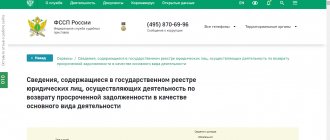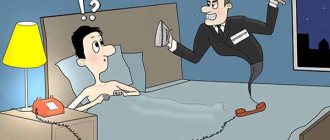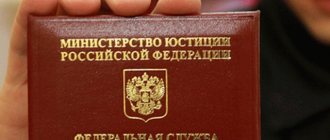According to the general rules, a pension refers to income, therefore, to the question of whether a bailiff has the right to seize a pension, any lawyer will answer positively. A direct indication of this is contained in Article 99 of the Federal Law “On Enforcement Proceedings”.
If there are funds in the pension account at the time the request is received from the FSSP, they will be transferred to pay off the debt. If the amount is insufficient, the bank will temporarily suspend operations and resume them after the Pension Fund makes the next payment. This will continue until the debt is fully repaid in accordance with the bailiff's order.
If you do nothing, all the money in your account will be seized.
As a rule, a pension account should be seized only if the debt is large and only after a trial has taken place and its decision has been submitted to the FSSP. In order to save at least part of the funds, it is necessary to notify the bailiff that a particular account is special for transferring payments for age or disability.
Arbitration manager Bankruptcy of individual entrepreneurs Bankruptcy of individuals
Debt collection from pensions – legal grounds
Living in a rule-of-law state obliges you to comply with its laws. And if debts have already accumulated and writs of execution have been issued, then this issue will have to be resolved somehow.
Article 101 of Law No. 229-FZ “On Enforcement Proceedings” defines the types of income protected from penalties:
- income received for compensation for harm to health;
- compensation, benefits, etc.;
- social payments;
- maternal capital certification means, etc.
However, various types of pensions, the amounts of which are sometimes equal to the subsistence level, remain under attack. Despite the fact that some types of social benefits and pensions are not subject to the calculation of income for the application of penalties, in reality this happens.
The bailiff executing the order does not have access to information from the bank:
- where did the money come from;
- assignment of amounts received to the current account.
As a result, as a result of the execution of proceedings, situations occur when funds are written off, the purpose of which is subject to the prohibition on such actions. This also includes pensions.
New in legislation 2020
In February 2020, amendments were made to the Federal Law “On Enforcement Proceedings”. The new version of Article 101 has been supplemented with a list of income that is not subject to recovery. These include:
- Survivor's pension.
- Monthly cash benefits.
- Payments if caring for a disabled person is provided, etc.
But the most important thing is that these changes are addressed to pensioners. This is especially relevant due to the fact that the majority of Russians of retirement age barely reach an income equal to the subsistence level.
Amendments to Law 229-FZ prohibited the collection of debts from insurance pensions and wages if their amount does not exceed the subsistence level.
After the Law of the Russian Federation as amended comes into force, the burden of payments will be lifted from many debtor pensioners. What else will the amendments bring in terms of regulating debt collections:
- The application of debt collections to pensions is completely excluded.
- Banks will open special accounts for social revenues, which will receive pensions and benefits - they are inviolable for writing off debts.
- Banks will be prohibited from complying with bailiffs’ orders if income from the accounts of defaulters is prohibited from collection.
What types of pensions are not subject to arrest?
Social benefits, which include some types of pensions, are designed to support people in difficult situations. It is assumed that the recipients of such payments for some reason do not have other sources of income. However, these factors do not prevent bailiffs from seizing social payments.
What income can be deducted?
If we are talking about an old-age pension, then it is allowed to make deductions within the framework established by law.
Do bailiffs have the right to seize a survivor's pension?
Until recently, situations were common in which bailiffs withheld debt from any amounts credited to the debtor’s account. This could be alimony, social benefits, all types of pensions.
It was assumed that FSSP employees could not obtain accurate information about what amounts of seizure are not allowed. This situation created a lot of inconvenience. The withdrawal of a number of government payments created many problems for minors, disabled people and other socially vulnerable segments of the population. But since June 1, 2020, changes made to the legislation have improved the process of monitoring the withdrawal of funds to repay the debt. It is prohibited to seize accounts and withhold the following proceeds to pay off debt:
- Compensation payments paid to care for disabled people.
- Alimony.
- Pensions awarded for the loss of a breadwinner.
- Maternity capital funds.
To comply with the new legislation, banks are required to independently determine the nature of incoming payments when crediting funds. Deductions are not made at the expense of the social funds listed above. If the debtor has several accounts, the analysis is carried out for each of them.
Does a bailiff have the right to seize a pension?
Previously, the answer to the question whether bailiffs can calculate debt from pensions was unequivocal: yes, they can. True, with certain restrictions: an amount in an amount not exceeding 50% of the receipt of funds . In some cases, this figure could be increased to 70% - if, for example, the debtor must additionally compensate for damage to health or moral damage.
Before the new law prohibiting bailiffs from deducting pensions came into force, the debtor was often left with only the minimum subsistence level from the initial receipt of pension benefits, according to Art. 440 of the Civil Code of the Russian Federation. In addition, the debtor had to prove to law enforcement agencies the intended purpose of the account.
Note: an account can be considered a target account only if it was opened for the purpose of receiving any social benefits. If you opened an account “for education”, “for buying a car”, etc., this will not be considered opening a target account.
Previously, it was possible to repay the amount of debt from pension payments. This right was enshrined in Federal Law No. 229-FZ of October 2, 2007 On Enforcement Proceedings . Now there is a whole range of payments and benefits from which bailiffs do not have the right to collect. This will happen if the corresponding bill is adopted by the State Duma.
Seizure of pensions by bailiffs in 2020
The presence of debts does not relieve a citizen from the obligation to pay them, even if he is a pensioner. If the court makes a decision to collect a debt from a citizen’s income, then funds will be withheld from any type of income, including pension income. The only exception is the survivor's pension.
Amount of deductions from pension payments
The solution in such a situation can be proposed as follows: the debtor should voluntarily write an application for payment of the debt in a certain amount, constituting a certain percentage of his income. If the bailiffs make concessions, then unpleasant consequences for collecting an overdue debt can be avoided.
There is a legal procedure that allows you to collect debt from any person, including a pensioner. Such law enforcement practice is carried out by the Bailiff Service (SSP), acting on the basis of decisions of the judicial authority. The law imposes restrictions on deductions from a pensioner’s income in favor of third parties. Let's look at the procedure and from what amounts legal deduction is made in 2020.
What can be the basis for arresting a pension?
Although at the moment it is too early to say that bailiffs will be prohibited from seizing funds from pensions, the bill still has a great chance of passing the third reading.
And it provides not only instructions regarding which payments are prohibited from being collected. It also contains regulations regarding the grounds for seizure of social payments (benefits, alimony, pensions, etc.):
- If the borrower does not pay at least the interest on the loan for a long time;
- If there are debts to pay alimony;
- If the debtor has unpaid utility bills.
In this case, the decision to initiate enforcement proceedings is made exclusively by a court - district, magistrate or arbitration. Even if the pension is seized, the bailiffs still do not have the right to completely seize the funds - the amount of the seized funds is always set in relation to the total amount of the debt.
Documents that serve as the basis for withholding funds from a pension
Documents allowing deduction from pension payments in favor of debt:
- According to the writ of execution, funds may be withheld from the pension in accordance with the decision of the court of general jurisdiction and arbitration;
- Court order;
- Payment agreement certified by a notary;
- Certificate issued by the labor dispute commission;
- Acts from the authorities controlling banking activities;
- Acts issued by courts or officials;
- Documents signed by bailiffs;
- Other acts and documents issued by other organizations, in cases provided for by the Law on Labor Pensions.
The relocation of a pensioner-debtor within the territory of the Russian Federation means that the executive document will be “followed” by the debtor to his new place of residence. The bailiff sends the writ of execution with a note on the amount of the remaining debt.
Seizure of pension by bailiffs
On the other hand, it is not for nothing that citizens are interested in how much bailiffs can withhold from accrued pensions. Since half of the money received may be too high an amount for the debtor. In this case, he can submit an application to the FSSP to reduce the amount of collection. Perhaps there are certain circumstances for this: a difficult financial situation or some situation that requires large expenses. Also if the payer has a dependent person.
Are payments for disability and old age subject to seizure?
- Go to a bank branch, get a certificate that money is being deposited into your account from the Pension Fund of the Russian Federation;
- Until the money is transferred to the collector, the debtor must present this certificate to the executor;
- Write an application to release part of the funds in the account;
- Submit a claim for the return of written-off money in the amount of 50 percent of the accrued amount.
If the bailiffs have seized funds that are not subject to recovery by law, then the debtor should write a statement to the executive authorities. The following supporting documents may be attached to the application:
Funds to pay the debt can be collected from any type of pension, including disability income received by citizens can also be seized. Let's take a closer look at the list of pension payments from which deductions can be made:
If the pension is delivered by mail
The presence of debts does not relieve a citizen from the obligation to pay them, even if he is a pensioner. If the court makes a decision to collect a debt from a citizen’s income, then funds will be withheld from any type of income, including pension income. The only exception is the survivor's pension.
In the first situation, the interested party should fill out a form to withhold the amount within the limits. In the second situation, when civil rights have already been violated, a complaint is filed with the FSSP structure or the prosecutor's office.
We have already noted that bailiffs make a mistake by writing off 100% of the defendant’s income. Nevertheless, such a situation may occur. What to do when an error occurs. Will some of the funds be returned? Let's figure it out.
Amount of deductions from pension contributions
How much bailiffs and the Pension Fund can deduct from pensions is regulated by the Law “On Insurance Pensions” (400-FZ). More than 50% of monthly pension payments cannot be withheld from the debtor. In this case, the amount remaining after deducting 50% should not be lower than the subsistence level for a pensioner established in the city of registration of the debtor. That is, if the cost of living in the city is 11,830 rubles, and the pension is 19,830 rubles, then, even if the court ordered a 50% withholding, the bailiffs will legally be able to withhold only 8,000 rubles from these amounts.
In exceptional cases, the court may order deductions from pensions by bailiffs in the amount of 70%. This percentage is established when a large amount of debt accumulates, as well as when a debt is formed to pay child support for minor children.
In case of withholding of debts based on a decision of the pension authority, the amount of such withholdings cannot exceed 20% monthly.
What is the limit on deduction for debt? And what cannot be recovered by law?
From salary, pension or other income, the bailiff can withhold a maximum of 50% of all writs of execution. And if the debt is for alimony or damages due to a crime, then up to 70%.
But regardless of the type of debt, you cannot foreclose on:
- the only housing other than a mortgage;
- clothing, shoes and household items, except jewelry;
- things that are needed for work, except for very expensive ones;
- Food;
- livestock and seeds (expensive dogs and premium feed do not count);
- a car for a disabled person;
- prizes and awards;
- money in cash and in accounts in the amount of the subsistence level for the debtor and his dependents.
When calculating the amount of collection, the bailiff is obliged to take into account the financial situation of the debtor. Bailiffs can also illegally write off money from accounts that receive alimony, benefits or compensation. This is prohibited and must be challenged.
Features of debt payments by disabled people
The decision on how much and according to what schedule a person with physical disabilities should repay the debt is made by the court.
The following factors are taken into account:
- disability group;
- degree of ability to work;
- availability of a place of duty.
Attention: the court is obliged to take into account the difficulties faced by a disabled citizen.
However, the latter must justify the impossibility of repaying financial obligations. Based on the documents and testimony provided by the defendant-debtor, the court has the right to:
- reduce the amount to be paid;
- establish a gentle payment schedule;
- completely release the defendant from repaying the debt.
For information: as a rule, disabled people of group 1 who spend the entire allowance on purchasing medicines to maintain the vital functions of the body are exempt from payments.
Laws and collection procedure
The procedure for collecting debts from pensions is regulated by the norms of the Civil Code of the Russian Federation (Articles 237, 333, 809). In addition, clauses regarding the repayment of overdue debt are in other legal acts (for example, the Federal Law “On consumer credit (loan)” dated December 21, 2013)
Another law according to which debts are collected from the population is Federal Law No. 229 “On Enforcement Proceedings” dated October 2, 2007. An important amendment to this law was adopted in February 2020. It prohibits the foreclosure of various social benefits, including old-age pensions.
In order for such prohibitive measures to begin to work, legislators proposed opening special accounts used only for crediting social benefits. But then it was decided that this would create unnecessary inconvenience for banks. Therefore, the bill adopted in the second reading looks somewhat different. Senders of social payments will be required to make a note that this money cannot be withdrawn for debts.
However, the corresponding changes will come into force only on June 1, 2020. So far, the old-age ban has not been applied, and funds are still withheld from pensioners.
Today, there are two ways to conduct legal proceedings for debt collection - writ and lawsuit proceedings. In the first case, a court order is issued (the presence of the plaintiff and defendant is not required for this), in the second, a decision is made.
The further debt collection procedure looks like this:
- A copy of the court order or decision is handed over to the bailiff.
- The FSSP officer issues a resolution to initiate enforcement proceedings within three days.
- A copy of the resolution is sent to the debtor for the loan or other payments. The document must indicate the period for voluntary fulfillment of the obligation. According to clause 12. Article 30 of Federal Law No. 229, it is 5 working days.
- If the defendant missed this deadline for valid reasons, he has the right to apply for an extension. If the debtor ignores the requirements of the law, the bailiffs begin to act forcibly.
Russian legislation provides for the following order of debt collection:
- First of all, foreclosure is applied to bank deposits or accounts of the debtor.
- If they are not there or there is not enough money for them, the pensioner’s valuable property (car, equipment, jewelry, as well as real estate, with the exception of the only home) may be confiscated.
- In the absence of all of the above, the bailiffs will begin to withhold part of the debtor’s pension or other income.
The work of bailiffs is made easier by the fact that many pensioners began to receive pensions on bank cards. In this case, it is enough for the bailiff to send an order to the bank to withhold a portion of the proceeds on a monthly basis.
If money is brought to a person’s home or he comes to the post office to get it, the writ of execution can be sent to the local branch of the Pension Fund. The deduction will begin from the month following the month of receipt of the writ of execution.
The procedure for deductions from pensions
A pensioner's debts can be repaid through deductions by bailiffs or deductions by a pension fund. In the first case, to make deductions, a court decision and a writ of execution are required.
Deductions will be made until the debt is fully repaid. So, if you are obligated to pay child support for one child, 25% is withheld from pensions. If alimony is not paid, a pensioner develops a debt, for the repayment of which the bailiff (based on a court decision) can collect from the debtor monthly up to 70% of income.
After the debt is repaid, the amount of withholding will again rise to the level of 25% until the debtor’s child reaches the age of majority.
You can find out about the amount of debt:
- from the bailiff;
- in a pension fund - in case of assignment of deductions by this body;
- in your personal account on the government services website in the debt section.
Important! The bailiff has the right to seize the property of the debtor if the latter has a large debt. In the event of further non-payment of the debt, the debtor's property may be sold; the bailiffs will use the proceeds to pay off the debtor's debts; the remaining funds, taking into account the costs of the bailiff service, will be returned to the debtor.
Procedure for repaying multiple debts
When a pensioner has been involved in several cases for a long time, for each of which there is a writ of execution, the bailiff must begin withholding the debt from the priority debt. For example, if there is a debt for alimony and a debt for utility bills, first of all, funds will be withheld from the pensioner in favor of alimony obligations. Only after this debt has been fully repaid will the bailiff begin to pay off the pensioner’s second debt.
Be sure to read it! Northern retirement experience for men and women: new calculation rules 2020
To collect funds, the bailiff must have the details of the claimant. If the bailiff does not know the details, he will still make deductions. In this case, the funds will be stored in a deposit account. Within three years, the creditor has the opportunity to provide his account number for crediting money. After three years, the funds will be transferred to the federal budget.
If, after repayment of all debts, money remains in the deposit account, they must be returned in full to the former debtor.
What to do if the bailiffs seized your pension?
Of course, the new bill implies that pensioners will be protected from bailiffs. But to get such opportunities, the pensioner himself will also have to work hard. The simplest action to take is to send an alert. This already saves the pension from complete seizure, leaving the debtor with at least 50% of the originally received benefits.
Any enforcement proceedings begin with a court decision. Take the order issued by the court in your case and study it carefully. Find out in this document how much funds should be withdrawn from you, as well as who exactly is involved in your production. If the document does not indicate information about the persons involved in your case, information on this issue can be found on the website of the FSSP (Federal Bailiff Service).
Next, the bailiff will send the debtor a notice of the commencement of enforcement proceedings. At this moment, the debtor has the right to notify the FSSP employee that he wishes to voluntarily repay the debt within the agreed period. If the debtor does this, he will have the opportunity to defer payments, achieve debt restructuring, installment payments, and also reduce the amount of the monthly payment in exchange for increasing the duration of proceedings.
Just after receiving such a notification, you need to send an application to the FSSP employee with a request not to completely withdraw funds from the pension account. Indicate the details of your pension account in the document and attach documentary evidence of the intended purpose of the account. For example, a copy of a pension certificate, an account statement indicating the sender of funds, etc. can serve in this capacity.
From this moment on, the bailiff will not confiscate the entire incoming pension, but only a part - from 0% to 70%, depending on the size of the pension (0% is possible for a pension equal to or less than the subsistence level in the region of residence).
What if the bailiff did not take into account your financial situation and writes off half your salary or pension? What do we have to do?
Send the bailiff a request to reduce write-offs. This can be done at any stage: even before the first write-off, even after the tenth. Attach documents: certificate of salary or pension; confirmation that the wife does not work or is on maternity leave; what children are there and how many there are; receipts for the purchase of medicines and certificates of disability.
The petition must be considered within ten days and a decision must be made. An ordinary letter of refusal without consideration of the merits is not an answer, but a reason for a complaint.
If the petition does not help and the bailiff does not want to cooperate, you can complain to his superiors. All complaints, claims and requests - only in writing and in duplicate. If this doesn't help, go to court. Keep in mind that courts can make illegal decisions, and if you are sure that you are right, contact higher authorities.
Consult a lawyer in advance on how to formalize everything and what to refer to in the statement of claim.
Are payments for disability and old age subject to seizure?
Yes, this right of an FSSP employee is reflected in the same law “On Enforcement Proceedings”. In this part, sometimes contradictions arise among citizens, since, having studied the legislation of the Russian Federation on the question: can bailiffs seize a pension accrued for disability, they receive a negative answer. The law states that payments from the Social Insurance Fund (FSS) cannot be recovered. But this condition does not apply in any way to the item of income for old age, disability and in case of temporary loss of ability to work. Therefore, you should not ask whether bailiffs can seize old-age pensions; they can. The main thing is to clarify the amount of debt that can be written off in this case.
What amounts are prohibited from making deductions?
Until recently, insurance pensions were not equated to income, which means that deductions could not be made from them. The legislator reviewed this rule of law and decided that pensions are also income, which means that a pensioner, if he has financial obligations, can have a portion of his pension withheld.
However, some types of pensions and benefits are still inviolable, namely:
- disability pension;
- survivor's pension;
- state payments for the birth of a child;
- child support;
- funeral benefit for a relative;
- compensation for the consequences of man-made accidents and disasters;
- social assistance to pensioners for the purchase of medicines and travel expenses.
Withholding from these types of payments is illegal.
What types of pensions cannot be seized?
Key changes in this area occurred with the initiation of a bill, which is popularly known as the “law prohibiting withdrawal of money from pensions.”
Please note: this bill has not yet been passed. It just recently passed the second reading in the State Duma, the third reading is yet to come. Thus, it is too early to say that this law has been adopted - it must undergo a third reading, after which it will either come into force, be rejected, or come into force with amendments.
If this bill is actually adopted, bailiffs will no longer be able to collect funds to pay debts on loans and housing and communal services, if these funds come as:
- Certificate for maternity capital (after its use in a particular institution);
- Alimony;
- Child benefit;
- Funeral benefit;
- Financial compensation for causing harm to health;
- Pension for the loss of a breadwinner. The inclusion of long-service pensions in this list is also being discussed;
- Social benefits for persons caring for disabled people.
Do the Ministry of Internal Affairs withhold debts from a pensioner?
Collection of debts from pensioners of the Ministry of Internal Affairs occurs on a general basis. This is evidenced by Appendix No. 1 to the order of the Ministry of Internal Affairs of Russia dated 01/09/2018 No. 7.
According to the document, deductions from pensions based on court decisions and other legal acts are made in the manner established by the legislation of the Russian Federation.
Accordingly, everything that concerns the work of bailiffs in relation to debtors also applies to pensioners of internal affairs bodies. In this case, no benefits or preferences are provided for this group.
What about the cost of living?
Currently, debtors, after the procedure of writing off funds against their debts, may find themselves below the poverty line and left without funds. Often, such a deduction leaves pensioners with amounts that are half the minimum subsistence level established in the region.
The fact is that while the Civil Procedure Code of the Russian Federation guarantees the preservation of the subsistence level, such a clarification is not provided for in the Law “On Enforcement Proceedings”. Last fall, this initiative of the Ministry of Economic Development was finalized and included in Federal Law-229 in the latest version.
If a pensioner cannot give 50% of his pension
If, due to certain circumstances, a pensioner cannot pay the assigned interest on his pension, he can file a corresponding application with the court. This right is given to him by Article 434 of the Civil Procedure Code.
This article allows the question of postponing or installment execution of a court order to be raised if there are circumstances that make it difficult to comply with a court order. An application is submitted to the court from the debtor himself or the collector, the bailiff.
The court, having considered the application and circumstances, the property status of the defendant, may delay payment of the debt or order payment in installments.
To make a decision, the court schedules a meeting at which the participants in the case must be present. But even if one of the parties does not appear at the meeting, a decision to postpone may be made.
ATTENTION! In order for the court to make a decision on installment execution, you must attach documents confirming financial difficulties to the application.
Also, the debtor must prove that withholding 50% of the amount from the pension deprives him of even the minimum necessary for living.
Long service pension has been seized (Ministry of Internal Affairs)
This question is asked by citizens who did not warn the bailiffs in advance. Now there is no need to contact the bank to clarify the circumstances; it is enough to receive an extract from your account, which will indicate the organization and purpose of payments received to you. This document is certified by the signature of the operator and the seal of the bank. This certificate must be provided to the bailiff who seized your bank account.
We recommend reading: Law of the Krasnodar Territory on labor veterans in 2020
The lower authorities also did not satisfy the applicant's request, while the Supreme Court decided to review the case due to the need to take into account the financial situation of the debtor. This practice is generally positive for citizens of retirement age who are debtors, as it allows them to reduce debt obligations for older citizens, reduce the financial burden and ensure an optimal standard of living.
If the pension recipient is a non-payer of alimony, the law allows for the withholding of funds in an amount equal to 70% of the total income. In other situations, the retention volume cannot exceed 50%.
Ban on write-offs
Removal of the seizure is possible only if the amount of the debt has been collected in full. In addition, this measure applies if the arrest was imposed against the background of the absence of legal grounds. To lift the arrest, the debtor must contact the senior bailiff with a corresponding statement, which requires indicating the grounds for writing it, and must also attach documents confirming this fact.
According to the law, bankruptcy of an individual implies certain financial restrictions on income. The money received goes to the competition account. A citizen is allocated a subsistence minimum for himself, as well as for minor children and/or disabled people living with him (if any).
If you receive a pension payment through a post office, it is not subject to seizure. But the bailiffs will continue to remind you to repay the debt, regardless of the method of receiving the money. The borrower's other income or property is subject to consideration.
Is it possible to protect yourself from bailiffs?
Of course it is possible. But this requires documentary evidence of the need for such an action. The reason for reducing payments may be a difficult situation when a person has no other income other than a pension. Also a compelling argument is the presence of dependents, in particular disabled people or minor children in the care of the borrower.
Yes maybe. In accordance with Art. 101 of the Federal Law “On Enforcement Proceedings”, compulsory social insurance payments are not subject to arrest. But, this rule does not apply to old-age, disability and temporary disability pensions.
Here, like a coin, there are two sides. The fact is that, first of all, bailiffs collect money from personal bank accounts. If there are not enough funds to repay the debt, then the bailiffs secondly seize the property.
Bailiffs seized non-deductible income
Today, a loan for pensioners is an affordable banking product. But the current economic situation is a “spear in the wheels” for many borrowers. Since an elderly person is most often on a well-deserved rest and does not have a stable job, a significant part of pensioner-borrowers become debtors. Let's figure out which types of pensions can be seized and which additional payments are inviolable.
We recommend reading: Concept and Structure of Low-Income Citizens Articles 2020
If survivor payments are the debtor’s only income, then they can be written off as payment of the debt, since you still need to pay off your obligations. The question is how much bailiffs can withdraw from such a pension.
How to protect your pension from bailiffs?
So, in the last paragraph we have already explained that it is very important to send the bailiff a notice of the assignment of your pension account. Be sure to indicate that your pension is your only source of income. Otherwise, the bailiff may seize the benefits, believing that you have other income.
Please attach an account statement to your application, which will be stamped by the bank and signed by an authorized bank employee. If you do everything correctly, the bailiff, according to the law, will issue a decree to reduce the amount collected from the debtor’s special account. The reduction will be made by 30-100% depending on the size of the pension.
Attention: if the debtor has dependent children or incapacitated relatives, he will almost certainly receive a seizure of his pension in the amount of no more than 30% of the benefits received.
How to reduce the amount of funds withheld
It is possible to reduce the amount of funds withheld from your pension. To do this, you will need to provide a document confirming that the account is a pension account. Difficult life situations, lack of other income, and the presence of dependents are taken as arguments for reducing the percentage of deductions.
You will need:
- write a statement and send it to the FSSP to your bailiff;
- submit an application to the Pension Fund;
- notify the court of the current situation.
In the written application, you must indicate that the bailiff has seized the pension account. Write that the pension is your only source of income. Attach a certified extract from the Pension Fund of the Russian Federation on the amount of accruals. The amount of deductions can be reduced to 50%, and in the presence of minor children - to 25-30%.
If benefits previously transferred to you (not subject to seizure) have already been written off, then they can be returned. To do this you need:
- take a bank statement about the debit;
- send a request to the bailiffs for the return of money;
- if you refuse to send a request to the court.
If simply asking does not help, consult a lawyer. Next, you can send a complaint to the chief bailiff or the prosecutor's office.
Would you like to write off all your debts?
A free consultation with our specialists will allow you to compare risks and take the first steps towards bankruptcy.
Send a request
Refund of money collected illegally
Despite the establishment back in 2007 of a list of income that cannot be levied, bailiffs very often withhold money from them. The fault of the bailiffs themselves in this situation is minimal: by seizing bank accounts, they are not able to track where the money is coming from. Therefore, penalties are automatically applied to both permitted sources of income and “forbidden” ones.
If such a situation arises, the citizen should contact the local bailiff service, of which he has become a “client”. You will need to take with you all the documentation confirming the origin of the illegally seized payments. After this, FSSP employees must stop deductions and return the illegally withheld money to the debtor’s account.
If it is not possible to reach an agreement with the leadership of the FSSP, the only way out is to go to court to restore justice.
For example, according to data for 2020, 270 lawsuits were filed in the courts of the Russian Federation, as a result of which 4.1 billion rubles, collected by mistake, were returned to the accounts of citizens.
Can bailiffs seize a pension?
According to the existing procedure, the debt should receive official status. It is determined by a document of the body having the relevant competence according to the letter of the law. Thus, the following has the right to impose sanctions on a citizen’s accounts:
Grounds for withholding part of the pension
Particular attention should be paid to cases of overpayment from the Pension Fund budget. They occur for two reasons and lead to different consequences for the recipient of the “extra” money:
As a result, during the compulsory execution of judicial acts, situations arise in which collection is made on funds related to income that cannot be collected (see above). We are also talking about collecting debts from pensions and benefits.
We recommend reading: What payment is due to war veterans who have reached 100 years of age?
Liability for non-payment of debts
For evasion of debt repayment under a writ of execution, administrative and criminal liability may be imposed on the debtor. As an administrative penalty, a fine may be imposed on the debtor, and in the case of criminal liability, the maximum penalty will be imprisonment of the debtor.
Be sure to read it! Transfer to the pension of a deceased spouse: rules, procedure, deadlines and documents
The most common measures taken administratively against a defaulter:
- penalties (according to Article 17.14 of the Code of Administrative Offenses of the Russian Federation);
- seizure of bank accounts;
- imposing a ban on driving and traveling abroad (Article 67 of Law No. 229-FZ);
- announcement of an executive search for the defaulter and his property (Article 65 of Law No. 229-FZ);
- forced delivery for drawing up an administrative protocol (Article 27.2 of the Code of Administrative Offenses);
- temporary imprisonment of the defaulter for the application of administrative measures to him (Article 27.3 of the Code of Administrative Offences).
In order for non-payment of debt to be considered a criminal offense, the actions of the debtor must contain the elements of a crime, namely:
- the debtor must maliciously evade payment of debts;
- the debtor may provide false information in order to reduce the amount of debts, etc.;
- the debtor may be hiding from the bailiffs.
If the debtor is identified, he will be subject to criminal punishment, and debts will be withheld from his pension.
The debtor should carefully monitor his debts, since in some cases, when debt arises, bailiffs may block all of the debtor's accounts. In practice, there are situations when, due to a debt of 20,000 rubles, accounts worth 1,000,000 rubles were blocked.
The debtor may simply find himself out of touch with life, especially considering that the seizure of the debtor’s accounts and plastic cards can be carried out even without notification of this by the bailiff.
In addition, debts prevent the debtor from crossing the border. Therefore, a long-awaited vacation in Europe may be disrupted due to a small debt on utility bills of 5,000 rubles. If there is debt, a visa may be denied.
How to remove restrictions caused by debt
You can get rid of social restrictions (traveling abroad), as well as unblock accounts only after full repayment of the debt. It is worth noting that if there is a debt, banks very quickly block cards, literally in a matter of hours. But it may even take several days to unlock.
To remove the restrictions, the debtor must obtain from the bailiff a statement of repayment of debts, and with this statement contact the bank to unblock the accounts. If your visa is refused, after receiving the extract, you can try to apply for a visa through the appeal process (check with the visa center for more details) or submit your documents again.
What you should know
- When a loan debt arises, it is recommended to pay it off before legal proceedings. Otherwise, you will need to pay additional court costs and state fees.
- The court will impose a penalty in any case , even if the debtor is a person of retirement age and has no other income besides a pension.
- After a court decision is made, the debtor can pay the debt voluntarily, within the prescribed period.
- If this does not happen, the writ of execution will go to the bailiff service, who will open a case on the debt.
- If the pensioner has no other means to pay the debt, the bailiffs will decide to deduct part of the pension payments.
- The amount of deduction should not exceed 50%. If the debt was incurred for alimony or compensation for damage caused to health, the withholding may be 70%.
- Collecting a debt by deducting it from a pension should not deprive the pensioner of the minimum funds necessary for subsistence.
- If the withholding leaves too little amount for living, you can go to court and raise the issue of installment payments on the debt or a deferment.
For the court, you need to prepare documents that confirm the difficult financial situation and the impossibility of complying with the instructions of the writ of execution.
How much does a bailiff have the right to withdraw funds from a pension?
denjist.ru What kind of money bailiffs cannot seize? Anyone can become a debtor in our difficult times. As they say, from the scrip, and from prison... The bailiffs, together with the judicial authorities, work quite quickly and when a debt arises, it doesn’t take much time before a bank account can be seized.
The procedure in this case is usually as follows. After discovering an error, the Pension Fund offers the pensioner to voluntarily return the erroneously paid funds.
- If this does not happen, then the Fund sends the claim to the court and, as a rule, in such a situation this court wins. After the court decision and the start of enforcement proceedings, the bailiffs will collect the entire amount of the overpayment from the pensioner.
Exceptions to the rules
Cases when bailiffs cannot withhold funds from a pension under a writ of execution are strictly regulated by law:
- Income received for the maintenance of minor dependents. It is impossible to make deductions for alimony payments, because Technically, these funds belong to the minor.
- Funds received as compensation for personal injury. This form of income is transferred from persons responsible for the deterioration of the debtor’s health and is not subject to withholding.
- Funds transferred by the debtor as compensation for the loss of a breadwinner. A pensioner who has lost a breadwinner receives a one-time compensation that is not subject to withholding by the bailiff service.
- Funds received as compensation for damage resulting from criminal actions by third parties. This payment is also a one-time payment and is used by the debtor to restore his own property.
- Other forms of income in cases where 70% of monthly payments are already withheld from the debtor’s pension.
In this matter, it is not entirely clear whether to pay 600 rubles. per month was established by the court or the court decision indicated only the total amount to be paid. With the first option, it is only possible to re-apply to the court to review the amount due to an increase in his income. And if the total amount is simply indicated and the terms are not indicated, then the perpetrator can pay as much as is convenient for him.
How much interest can bailiffs deduct from a pension to close a loan?
In accordance with Article 26 of the Law “On Labor Pensions”, deductions from labor pensions are made on the basis of: 1) executive documents; 2) decisions of bodies providing pensions on the recovery of amounts of labor pensions overpaid to a pensioner in connection with a violation of paragraph 4 of Article 23 of this Federal Law; 3) court decisions on the recovery of labor pensions due to abuses on the part of the pensioner, established in court.
Deductions are made in an amount calculated from the amount of the established labor pension. No more than 50 percent can be withheld, and in cases established by the legislation of the Russian Federation, no more than 70 percent of the labor pension. Deductions based on decisions of the bodies providing pensions are made in an amount not exceeding 20 percent of the labor pension.
In the event of termination of payment of a labor pension before full repayment of the debt on overpaid amounts of the said pension, withheld on the basis of decisions of the bodies providing pensions, the remaining debt is collected in court.
If a person is not provided with all parts of the labor pension provided for by this Federal Law, the deductions from the labor pension specified in this article are made from the established parts of this pension.
A properly executed executive document is the basis for withholding money from the debtor’s pension. Deductions are made in the amount specified in the resolution on the collection of funds, and can be no more than 50 percent of the pension, and if it is arrears for alimony, then even 70 percent.
In case of simultaneous deduction for various reasons, the amount of recovery cannot exceed 50 percent of the pension due to the pensioner. If the payment of a pension is terminated before the debt on the overpaid pension amounts is fully repaid, the remaining debt is retained in court.
Legislation prohibiting the collection of debts from pensions
The procedure for writing off debt is regulated by legislation on enforcement proceedings. Art. 101 provides an exhaustive list of sources of funds that are not subject to foreclosure. Pension payments are not included in this list.
Withholding money from pensions by representatives of the FSSP is carried out if there are grounds, that is, with executed executive documents, a court decision to write off money from a pension, a decision of the Pension Fund (for example, if evidence of pension overpayments was discovered).
Why might automatic collections occur? The following types of debt are distinguished:
- Loans from banks and microfinance organizations.
- Delays in rent.
- Non-payment of taxes.
- Fines from the traffic police.
- Court decisions on civil contracts with a verdict on compensation or return of the amount.
- Refusal to pay alimony.
Find out about your debt
Free online legal debt check
Find out your debt
In most cases, the amount is written off from the defendant’s salary, business income, and other income. What should you do if you notice a write-off from your pension?
Question answer
Is a bankrupt's pension subject to penalties?
In accordance with Art. 101 FZ-229, the type of pension matters. Collections from old-age and disability pensions are carried out in accordance with the general procedure; from survivors' pensions the debt is not withheld under any circumstances.
Did the president really recently sign a law that introduces the inviolability of social support for Russians?
Federal Law No. 14-FZ of February 21, 2019 introduces some important amendments to the current Federal Law “On Enforcement Proceedings”. They relate to the procedure for transferring funds withheld from earnings and other income (the need to indicate a code in payment documents is introduced in order to identify payments).
In Art. 101 FZ-229 previously listed social payments protected from collection. The President essentially prohibited in this law the foreclosure of only one type of payment - compensation in connection with the occurrence of emergency situations (subject to certain conditions).
How is debt collection from pensioners carried out if the pension becomes inviolable?
Federal Law No. 12-FZ, adopted in February 2020, does not prohibit debt collection from old-age pensions. In clause 9, part 1, art. 101 FZ-229 separately states that recovery is not carried out from insurance coverage for compulsory social insurance, with the exception of old-age and disability pensions.
In addition, bailiffs can foreclose on property owned by a pensioner. In this part, these citizens also do not have any benefits. In addition, the penalty can be applied to the wages of working pensioners.
Can bailiffs collect from pensions under a writ of execution below the subsistence level?
Federal Law No. 229 “On Enforcement Proceedings” says nothing about such a situation. According to Art. 99 of this law, the amount of deduction can be up to 50% of income, in some cases even up to 70%.
It must be borne in mind that the Constitutional and Supreme Courts (the latter in ruling No. 45-KG 16-27 of January 12, 2017, for example) have repeatedly expressed the opinion that when determining the percentage of withholding from a pension, which is the main source of income, it is necessary to take into account the interests of the parties , including the debtor and his dependents. The law allows the bailiff, when determining this percentage, to proceed from the specific circumstances of the case. Therefore, if such a situation arises, you can petition the bailiffs and the court to reduce the retention percentage.
When deductions on the borrower’s debt obligations are impossible
Not all types of property and income of a pensioner are used to fulfill debt obligations. Debts are not subject to collection:
- survivor's pension;
- compensation provided to victims of radiation and man-made disasters;
- insurance coverage for compulsory pension insurance;
- benefits for caring for an incapacitated disabled person;
- alimony;
- one-time financial assistance provided due to a natural disaster, death of a relative, or terrorist attack;
- social benefit for funeral.
Types of property from which debt cannot be collected:
- the only housing that is not mortgaged;
- household furnishings, excluding jewelry;
- objects necessary for conducting work activities;
- car for disabled people;
- prizes, awards;
- pets, livestock, food, seeds.
Pensioners-debtors will be left with a living wage
The citizen will not be deprived of all funds. The legal debt from pensioners is withheld from part of their pension. The amount subject to recovery is in excess of the subsistence minimum (PL) in the region or in Russia (if in a particular city or region the indicator is lower than in the country).
When considering cases of borrowers with disabilities, PMP for disabled people is taken into account.

- Potato zrazy with meat
- 15 signs of cancer that men should not ignore
- When does the statute of limitations expire for fines for an offense?








